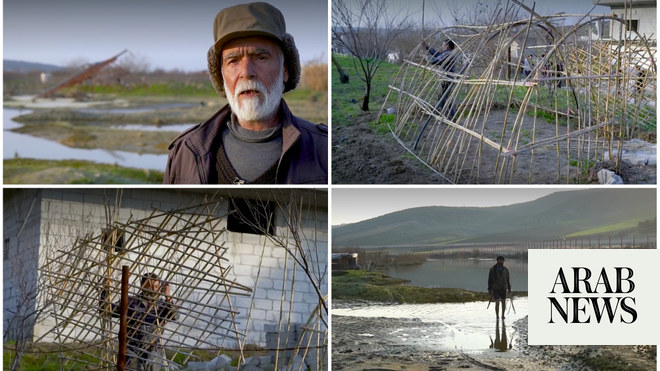
Displaced families in Philippines celebrate Ramadan in makeshift ‘tent city’
MARAWI CITY: Thousands of Filipino Muslims who lost their homes in a bitter five-month battle between security forces and terrorists in 2017 welcomed Ramadan this year in evacuation centers and a “tent city.”
The country’s only Muslim city fell to the Daesh-inspired Maute Group, forcing 44,000 families to flee, according to official figures. Up to 18,000 of these families are still living in makeshift shelters awaiting a return home.
In Sarimanok, one of Marawi City’s evacuation sites, Imam Omar Tindugan Shariff, 65, who serves as spiritual leader in the community, told Arab News that “life is hard, but we’re OK somehow because we get to receive help from well-meaning people, especially fellow Muslims.”
Holding his three-year-old grandson as he stood outside his tent, Shariff said the community also received help from the government and different aid organizations.
Most of the help came in the form of food and other items, but sometimes cash assistance was also offered.
“It’s not enough, but it helps us survive and so we are still thankful for that,” he said.
Shariff and his family moved to the tent city in April last year after spending several months with relatives who took them in after the conflict forced them to to flee their home. Eleven members of the Shariff family, including his grandson Abdul Ryan, share the small tent.
“This is the second year we are spending Ramadan here (at the tent city). Before the siege, we always had a beautiful celebration for Ramadan. Now we only have an improvised mosque, it’s a tent with tarpaulins,” Shariff said, adding that food for iftar is also donated by various organizations.
“On days when when there are no food donations, we prepare on our own, usually just rice and sardines,” he said.
Shariff admits there are times when he asks God: “Why did this happen to us?”
“But I know this is just a test of faith for us. If you’re a true Muslim, Allah will sometimes let you face challenges. At first, you will face hurdles and if you are able to overcome them, Allah will reward you.”
Shariff said he still hopes that through the grace of Allah, a better life awaits the evacuees. “It never crossed my mind to turn my back on my faith, even if those who did this to us claim to do it in the name of Islam,” he said.
“We lost our house. It was burned down at the height of the fighting. And right now I don’t have enough money to send my daughter to school. So she has stopped attending school for two years now. She is in her second year in college.”
Amid their hardships, Shariff said his faith “is what helps me survive.”
Asked about his thoughts on the terrorists who attacked their city, he replied: “Those who did this to us, the Maute group, what they did is un-Islamic. Muslims are for peace, there’s no rich or poor, we are all equal — that’s the real Muslim. I don’t believe in what Daesh say they are fighting for.”
During the holy month, Shariff said his prayers are for the government to allow the Marawi City evacuees to return home.
Mansawi Hadinonamen and his family were also displaced during the siege. But unlike Shariff, they have already moved to temporary shelters in Sabonsongan, where living conditions are better than in the tent cities.
Hadinonamen’s family lost everything in the war. But still he is grateful they are alive. He also looks forward to rebuilding their house when the government allows them to return.
Asked what Ramadan means to his family in their current situation, he replied that it is a time to reflect and show that they remain strong in their faith.
“The war has taken everything from us — our house, our belongings — but not our faith,” he said.
Another resident, Khalid, said fasting has become a daily recourse for many evacuees. Food donations are not enough.
“There are no regular food donations and we don’t have enough money to buy food. Some areas also lack water, so people are forced to use rainwater that is not safe for drinking,” he said.
Meanwhile, Marawi Mayor Majul Gandamra declared that the city is now “on its way to being well.”
However, the rehabilitation process has yet to be completed, and Gandamra urged people to put more emphasis on social healing.
“Peace starts with us. Peace must be realized,” he said during the culmination of the Week of Peace Festival to commemorate the Marawi siege.












